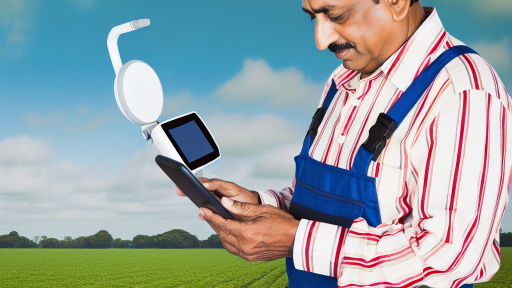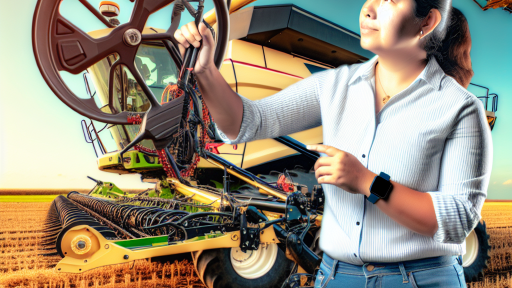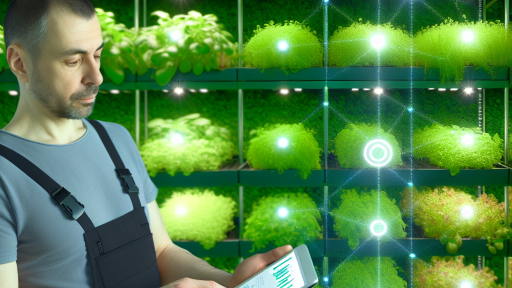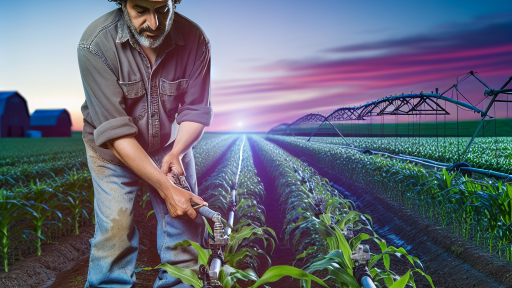Introduction to Smart Irrigation
Definition of Smart Irrigation
Smart irrigation refers to the advanced methods of delivering water to crops.
It utilizes technology to optimize water usage while enhancing agricultural productivity.
This approach combines sensors, weather data, and automation.
Farmers can now manage irrigation systems efficiently and effectively.
Overview of Smart Irrigation
Smart irrigation systems improve water conservation practices.
They use real-time data to adjust watering schedules.
Moreover, this technology can detect soil moisture levels accurately.
As a result, crops receive just the right amount of water.
This method minimizes waste and reduces costs.
Benefits for Modern Farmers
Farmers experience increased crop yields with smart irrigation systems.
These systems help to conserve vital water resources.
They also reduce labor costs by automating irrigation processes.
Additionally, smart irrigation enhances the sustainability of farming operations.
As a whole, these technologies contribute to better overall farm management.
Water Conservation
Reducing Water Usage
Smart irrigation systems efficiently manage water usage on farms.
Transform Your Agribusiness
Unlock your farm's potential with expert advice tailored to your needs. Get actionable steps that drive real results.
Get StartedThese systems utilize real-time data to determine water needs.
Farmers can monitor soil moisture levels remotely.
This technology enables precise watering schedules.
As a result, water waste decreases significantly.
Improved Crop Yields
Efficient water usage translates to healthier crops.
Smart irrigation reduces the risk of over or under-watering.
This balance fosters optimal growth conditions.
Moreover, it helps maintain consistent yields throughout the season.
Farmers often see an increase in crop quality as well.
Environmental Impact
Smart irrigation helps protect local water resources.
By minimizing runoff, it reduces soil erosion.
This approach conserves essential habitats around farms.
Consequently, farmers contribute positively to the ecosystem.
Climate change effects are also mitigated through water conservation.
Cost Savings
Adopting smart irrigation can lead to substantial cost savings.
Farmers save on water bills with reduced usage.
Additionally, they may decrease energy costs related to pumping water.
Investing in these systems pays off over time.
Ultimately, smart irrigation fosters long-term financial sustainability.
Increased Crop Yields: The Impact of Efficient Water Management
Optimizing Water Usage
Smart irrigation systems optimize water usage effectively.
By using advanced technology, farmers target moisture needs.
This minimizes water wastage and ensures crops receive adequate hydration.
As a result, crop yields significantly increase.
Real-Time Monitoring
Farmers can monitor moisture levels in real time.
Showcase Your Farming Business
Publish your professional farming services profile on our blog for a one-time fee of $200 and reach a dedicated audience of farmers and agribusiness owners.
Publish Your ProfileAdvanced sensors provide immediate feedback on soil conditions.
This allows for timely adjustments in irrigation practices.
Farmers respond quickly to any changes in moisture levels.
Cost Reduction
Utilizing smart irrigation systems lowers overall water costs.
Efficient water management reduces the reliance on pumping systems.
This translates into lower energy expenses for farmers.
As a consequence, farmers can reinvest savings into their operations.
Improving Crop Quality
Consistent moisture levels enhance crop quality significantly.
Healthy plants resist diseases and pests more effectively.
Furthermore, uniform growth leads to higher market value.
This ultimately benefits farmers’ profitability and sustainability.
Adapting to Climate Change
Smart irrigation practices help farmers adapt to climate variability.
Farmers can manage water resources during droughts more efficiently.
This adaptability protects against crop failures and losses.
Consequently, farmers maintain productivity despite changing conditions.
Increasing Efficiency with Automation
Automation boosts the efficiency of irrigation processes.
This technology reduces the workload for farmers.
Farmers can focus on other critical farming activities.
Fully automated systems can operate independently and intelligently.
Delve into the Subject: Essential Precision Farming Tools for Modern Farmers
Cost Savings
Long-Term Financial Benefits for Farmers
Smart irrigation systems significantly reduce water usage.
This technology ensures that crops receive optimal moisture levels.
As a result, farmers can lower their water bills over time.
Investing in smart irrigation leads to substantial savings on labor costs.
Automation minimizes the need for manual irrigation efforts.
Additionally, these systems reduce the risk of over-irrigation.
Over-irrigation can cause crop damage and increase expenses.
Cost savings extend to improved crop yields as well.
Healthy crops result in higher market prices and profit margins.
Moreover, farmers often see a return on investment within a few seasons.
Many manufacturers offer financing options for smart technology.
This makes it easier for farmers to adopt new systems.
Furthermore, smart irrigation may increase eligibility for government incentives.
Such programs often support sustainable agricultural practices.
Ultimately, smart irrigation contributes to financial stability.
Farmers can allocate resources to other essential improvements.
Gain More Insights: Robotic Solutions For Pest Control
Environmental Impact: Reduction of Runoff and Soil Erosion
Understanding Runoff
Runoff occurs when rainwater flows over the soil surface.
This water can carry sediments and pollutants into nearby water bodies.
Consequently, excess runoff leads to poor water quality and ecosystem disruption.
Showcase Your Farming Business
Publish your professional farming services profile on our blog for a one-time fee of $200 and reach a dedicated audience of farmers and agribusiness owners.
Publish Your ProfileSmart Irrigation Systems
Smart irrigation systems efficiently manage water usage on farms.
They utilize sensors to gauge moisture levels in the soil.
This technology optimizes irrigation schedules based on real-time data.
Reducing Runoff with Technology
By delivering precise amounts of water, these systems minimize excess water use.
This significantly reduces the volume of runoff generated during watering.
As a result, farmers can protect nearby water sources from contamination.
Soil Erosion Mitigation
Soil erosion occurs when water washes away topsoil and nutrients.
This process can damage crops and decrease land productivity.
Smart irrigation helps maintain soil structure by preventing over-saturation.
Benefits for Modern Farmers
Farmers adopting smart irrigation see improved crop yields.
They enjoy lower costs associated with water use and soil management.
Additionally, their sustainable practices contribute positively to the environment.
Impact on Ecosystems and Agriculture
Incorporating smart irrigation leads to significant reductions in runoff.
This technology also helps mitigate soil erosion effectively.
Modern farmers thereby contribute to healthier ecosystems while boosting productivity.
Gain More Insights: Advanced Remote Sensing Techniques for Farming
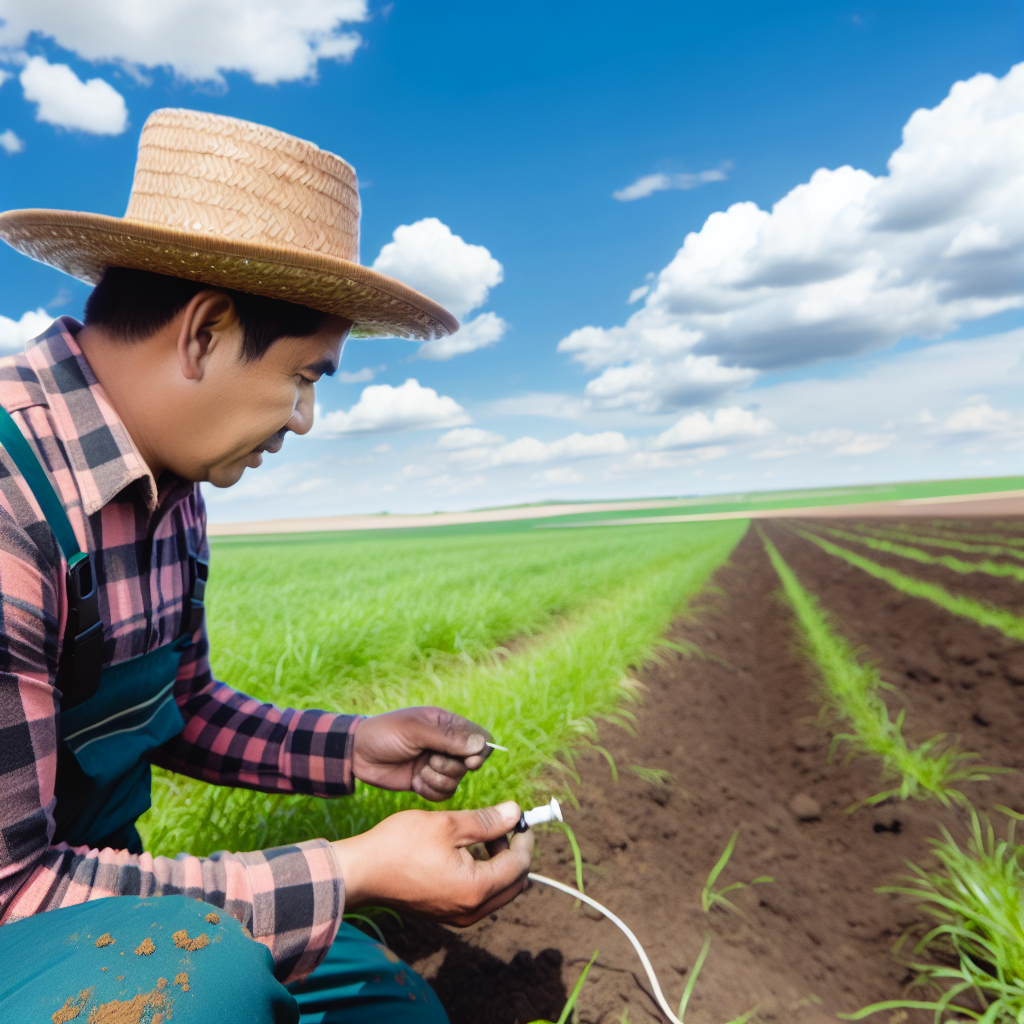
Technology Integration
Compatibility with Other Farming Technologies
Smart irrigation systems seamlessly integrate with various farming technologies.
This compatibility enhances overall farm management capabilities.
Farmers can connect irrigation with precision agriculture tools.
For instance, soil moisture sensors significantly improve irrigation efficiency.
Moreover, these sensors provide real-time data for informed decision-making.
Farmers can also utilize drone technology alongside smart irrigation systems.
Drones help monitor crop health and assess irrigation effectiveness.
This combination ensures timely interventions, promoting optimal crop growth.
Data Analysis Tools
Smart irrigation systems generate valuable data for analysis.
With data analytics, farmers gain insights into water usage patterns.
This knowledge allows for the optimization of irrigation schedules.
Furthermore, predictive analytics forecast future water needs based on historical data.
Farmers can adjust their practices accordingly to avoid water waste.
Data sharing among farmers fosters community learning and growth.
Integrating Renewable Energy Sources
Smart irrigation can connect with renewable energy systems.
For example, solar panels power irrigation systems efficiently.
This integration reduces reliance on fossil fuels significantly.
Consequently, it lowers the operation costs over time.
Farmers can also store energy generated during peak sunlight for later use.
This sustainability approach enhances the farm’s overall efficiency.
Learn More: Enhancing Crop Yields with Smart Irrigation
Data Management: Utilizing Real-Time Data for Informed Decisions
The Importance of Real-Time Data
Real-time data empowers farmers to make immediate decisions.
This data improves the efficiency of resources used.
Farmers can monitor soil moisture levels continuously.
Showcase Your Farming Business
Publish your professional farming services profile on our blog for a one-time fee of $200 and reach a dedicated audience of farmers and agribusiness owners.
Publish Your ProfileMoreover, they can track weather conditions almost instantaneously.
Enhancing Irrigation Strategies
Farmers can adjust irrigation schedules based on real-time information.
For example, data can reveal when rain is imminent.
This allows them to delay irrigation, thus conserving water.
Additionally, precise data helps prevent overwatering crops.
Improving Crop Yield
Utilizing real-time data can significantly boost crop yields.
Farmers can respond quickly to changing conditions in the field.
They can also optimize fertilization and pest control measures.
As a result, crops grow healthier and more resilient.
Cost Savings and Resource Efficiency
Real-time data aids in reducing operational costs.
Farmers can minimize waste of both water and fertilizers.
By using targeted applications, they save both time and money.
This leads to more sustainable farming practices overall.
Data Integration and Management Tools
Modern technology provides various tools for data management.
Farmers can use software solutions to collect and analyze data.
These tools facilitate better decision-making and strategy development.
They streamline the entire farming process from planting to harvest.
Future Trends in Smart Irrigation
The future of smart irrigation promises further advancements.
Emerging technologies will enhance data collection methods.
Farmers will have access to even more accurate forecasts.
Thus, smart irrigation will continue to evolve and improve.
Scalability: Smart Irrigation Solutions for Farms of All Sizes
Adapting to Farm Size
Smart irrigation systems adapt to the specific needs of various farm sizes.
Small family farms benefit from cost-effective solutions.
In contrast, larger farms require more comprehensive systems.
Flexibility allows systems to expand or contract as needed.
This adaptability supports different farming methods and crops.
Technology Integration
Utilizing cutting-edge technology enhances scalability.
Sensors and weather data optimize water usage efficiently.
Farmers can monitor systems remotely via mobile devices.
This automation reduces labor costs and increases efficiency.
Integration with existing tools provides seamless operation.
Customizable Solutions
Smart irrigation offers customizable options tailored to individual needs.
Farmers can choose between drip or sprinkler systems based on their consultation.
Software solutions enable real-time adjustments based on crop requirements.
This personalization maximizes crop yield while minimizing waste.
Farmers can implement gradual upgrades as the farm grows.
Economic Benefits
Investing in scalable smart irrigation systems offers long-term economic advantages.
Reduced water usage lowers utility bills for farmers.
Increased crop productivity leads to higher overall profits.
Grant programs often support the implementation of these technologies.
Showcase Your Farming Business
Publish your professional farming services profile on our blog for a one-time fee of $200 and reach a dedicated audience of farmers and agribusiness owners.
Publish Your ProfileFarmers can take advantage of government incentives for sustainable practices.
Environmental Impact
Smart irrigation minimizes water usage, resulting in a smaller ecological footprint.
Efficient water management helps maintain local biodiversity.
Conversely, this technology can decrease soil erosion and nutrient runoff.
Farmers play a crucial role in promoting sustainable practices.
Scalable systems contribute to both farm resilience and environmental health.
Additional Resources
Precision Agriculture: Benefits and Challenges for Technology …

